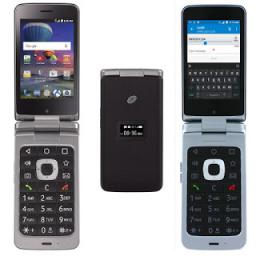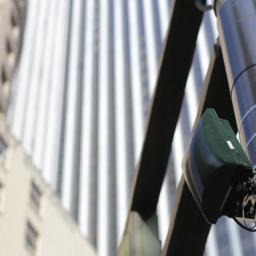
The
first Android flip phone to be sold in the US is here. TracFone's ZTE Cymbal T is now available to order, today, from Best Buy at the early adopter price of $100. Other than having a flip phone form factor, the Cymbal is a typical entry-level Android phone with a nameless quad-core processor, 3.5 inch 320i-480px screen, 8GB (3GB usable) of internal memory, 1GB of RAM and Android 5.1.1 Lollipop. There's a memory card slot, a 5MP camera and a removable battery. The Cymbal runs on the Verizon network and
includes 4G LTE support.
The ZTE Cymbal is quite large for a flip phone at 4.72i-2.40i-0.72 inches. Compared with the Classic Motorola RAZR V3, the Cymbal is almost an inch taller, and obviously wider and thicker. On the other hand, at 3.5 inches, the screen is small when compared with most current phones. While there is a roomy physical keyboard, it's only used for dialing phone numbers, the smallish on screen QWERTY keyboard is used for texting and other text entry.

Globalstar Inc., operator of a low Earth orbit (LEO) satellite constellation for phones, plans to open up
another Wi-Fi channel, but only for those who can pay. Globalstar's petition seeks to expand its use of the 2483.5-2495 MHz (Channel 14) band. Unlike all other Wi-Fi channels, which are open to any FCC-approved device and don't require permission, this one would be under Globalstar's control. A carrier that makes a deal with Globalstar might be able to set that channel aside for its own subscribers.
While users in some other countries have been using channel 14 for years, part of it has been set aside in the U.S. as a guard band to protect Globalstar's satellite frequencies. Most Wi-Fi devices could be easily modified via firmware upgrades to take advantage of the extra channel. The plan has come under sharp criticism during the lengthy approval process at the FCC. Microsoft, Google, the cable industry and backers of Wi-Fi and Bluetooth all have filed comments urging the agency not to approve the scheme. Tests at the FCC have shown it would interfere with Bluetooth, which already uses part of the channel. But the non-profit Public Knowledge is supporting the plan, as encouraging more competition and more public internet access options. The Globalstar proceeding has been in the works
going on three years.
 The first Android flip phone to be sold in the US is here. TracFone's ZTE Cymbal T is now available to order, today, from Best Buy at the early adopter price of $100. Other than having a flip phone form factor, the Cymbal is a typical entry-level Android phone with a nameless quad-core processor, 3.5 inch 320i-480px screen, 8GB (3GB usable) of internal memory, 1GB of RAM and Android 5.1.1 Lollipop. There's a memory card slot, a 5MP camera and a removable battery. The Cymbal runs on the Verizon network and includes 4G LTE support.
The first Android flip phone to be sold in the US is here. TracFone's ZTE Cymbal T is now available to order, today, from Best Buy at the early adopter price of $100. Other than having a flip phone form factor, the Cymbal is a typical entry-level Android phone with a nameless quad-core processor, 3.5 inch 320i-480px screen, 8GB (3GB usable) of internal memory, 1GB of RAM and Android 5.1.1 Lollipop. There's a memory card slot, a 5MP camera and a removable battery. The Cymbal runs on the Verizon network and includes 4G LTE support.